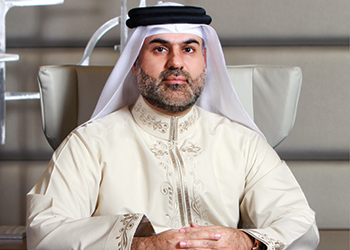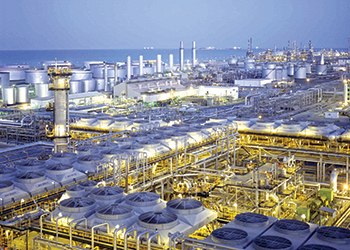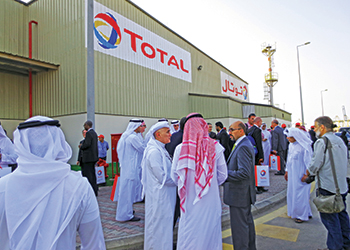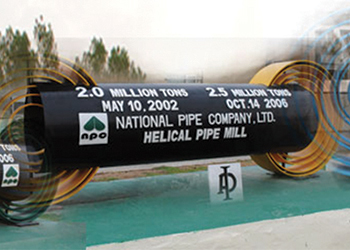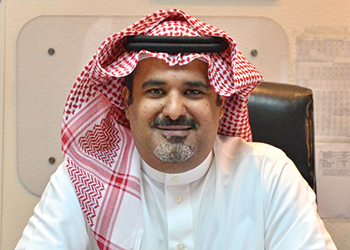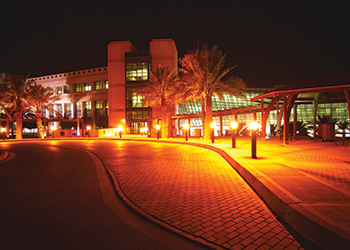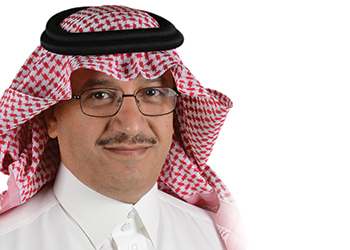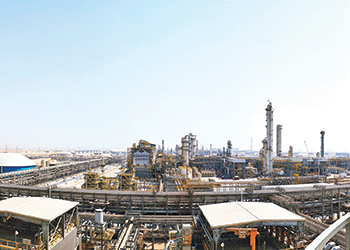
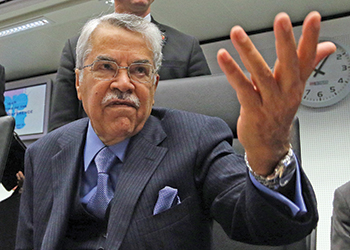 Naimi ... hoping markets will rebound
Naimi ... hoping markets will rebound
The minister was firm when he acknowledged that shale oil has its place in the industry’s future, but said that Saudi Arabia has no plans to produce it
The Saudi oil minister’s view of the industry being cyclical, and the price being lower for longer has people wondering how the industry will bounce back and rebalance.
Ali Al Naimi was speaking on the second day of IHS CERAWeek, which kicked off with a welcome and ministerial address given by him.
He started off telling jokes, lightening the somewhat stuffy mood, by claiming that Daniel Yergin, chair of IHS CERAWeek, only invites him to speak when there is a crisis. Many laughs were garnered by the audience once again when Naimi stated that he’d even survived peak oil, and had a t-shirt lying around somewhere that said so.
Naimi’s experiences have taught him that the oil business is inevitably cyclical. "Demand rises and falls. Supply rises and falls. Prices rise and fall," he said.
Naimi joined Aramco as an office boy in 1947. During his seven decades in the oil industry, he’s seen oil under $2 per barrel and at $147, with much volatility in between. Having been through booms and busts, he is confident that the global oil market will rebound.
When asked by Yergin when he predicts the crisis will end, he responded: "If I knew that, you and I would go to Las Vegas. But it will end," again, getting quite a chuckle from the audience.
A week ago Russia, Saudi Arabia, Qatar and Venezuela proposed an oil freeze that would cap production at January’s levels.
Yergin asked Naimi to explain an oil freeze, and Naimi was quick to say that it’s the beginning of the process, "We want to get all the major producers to agree not to add barrels during this high inventory we have now. It’s not like cutting production. That is not going to happen."
Naimi hopes to let demand rise, let some inefficiencies in supplies decline and eventually the market will bounce back. "We’ve had one meeting, four countries agreed. In March there will be another meeting."
Would countries from across the Gulf be participating in the freeze? He’s unsure, but felt that "Most of the countries will freeze."
The Minister was firm when he acknowledged that shale oil has its place in the industry’s future, but said that Saudi Arabia has no plans to produce from shale today because it has an abundance of conventional reserves.
"We are looking for shale oil and shale gas. We will produce it one of these days. I am a geologist by trade. I know that shales do have oil in them. It’s just hard to get them out," Naimi said. "We are finding it in Saudi, but we have much more economic ways to produce right now. We are doing our homework for the future."
The minister thinks solar will be the answer in the future. "We have a solar centre, and I recently gave the director of the centre a challenge." That challenge? Currently Saudi is exporting 7 million barrels of oil every day – the minister would like to convert solar into BTUs and generate enough solar as an equivalent to 7 million barrels of oil. "So we can export power and not oil. Solar is definitely going to be the answer to energy’s future."
The past year or so is often compared to 1986. The minister feels strongly that this time it’s different. "This is not 1986. This is definitely different - 1986 was a reaction to cutting, mainly by Saudi Arabia. In 1981 we were producing close to 10 million barrels a day, in 1985 less than 3 million," he remembered. "In 1981 the price of oil was over $40, in 1985 it was less than $9."
Before November 2014, the price of oil was simply too high, so every barrel was being produced. The minister said we need to go back to marginal costs and let the marginal costs drive the demand.



































































